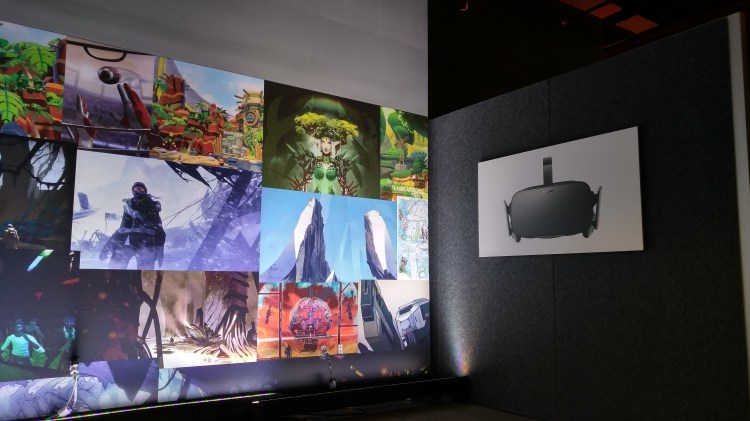SAN FRANCISCO — After hearing it three times in three meetings, I started to notice that many of the developers working on Oculus Rift games are all using a new buzzword: progression. Or at least that’s a new word for a group of virtual reality developers that have long focused on quick experiences rather than long-form gameplay.
Oculus VR, the Facebook subsidiary that is preparing to launch the Rift head-mounted display in two weeks, held an event on Monday as part of the Game Developers Conference that brought together a couple dozen studios working in the space. As we approach the March 28 shipping date for the Rift, it is clear that developers want everyone to realize that they are building real games that are more than just tech demos. Nearly every studio I spoke with talked about how they have systems in place to give players a reason to play for long periods of time. These include ideas like leveling up your character, unlocking items over time, and score-chasing on leaderboards.
Having progression in VR is different from a lot of what we’ve seen from VR “experiences” so far and similar to what we’re used to from console and PC releases. Having games that feel complete and rewarding is crucial to developing VR into a business that generates $30 billion in spending by 2020 as predicted by tech adviser Digi-Capital. Key examples of this are VR Sports Challenge, Eve: Valkyrie, and AirMech.
VR Sports Challenge is the Wii Sports for Oculus’s upcoming Touch controllers. This is a standout game in terms of “VR as an experience.” Developer Sanzaru is already talking about implementing a pass-and-play mode, where a group of friends can take turns performing slow-motion dunks (which is incredible). But VR Sports creative director Tin Guerrero told GamesBeat how they have also striven to make it always feel like the player is working toward something. That way, when all your friends go home, you have a reason to keep playing.
Eve: Valkyrie is similar. It is an online multiplayer dogfighting space shooter. It’s an incredible sensation to whip around in your nimble fightercraft to take on enemies, but this is a fully realized competitive game similar to Counter-Strike or World of Tanks. But developer CCP Games’ goal isn’t to blow you away with an “experience.” The company wants you returning every day because the gameplay is fun.
And AirMech is one of the best examples of VR’s new emphasis on fully realized games. The multiplayer arena battler originally came out in 2012 for consoles and PC, but it is getting new life with the Rift. Seeing AirMech’s playfield sprawl out in front of me like some kind of cyberpunk tabletop game was one of the coolest things I’ve seen in a while, but studio Carbon Games is using this impressive technology to make its deep action-strategy game more accessible. AirMech has a single-player campaign and several multiplayer modes, and its director James Green told us that he wants people playing the game in VR for hours — just like he does.
None of this means that you won’t get quick experiences in VR. HTC Vive’s early Portal demonstration isn’t really a full game. But it’s clear that developers see the importance of giving early adopters a reason to feel good about spending hundreds of dollars to jump into virtual reality. And for many people, that means bringing traditional gaming qualities to this exciting cutting-edge technology.
VentureBeat's mission is to be a digital town square for technical decision-makers to gain knowledge about transformative enterprise technology and transact. Learn More

